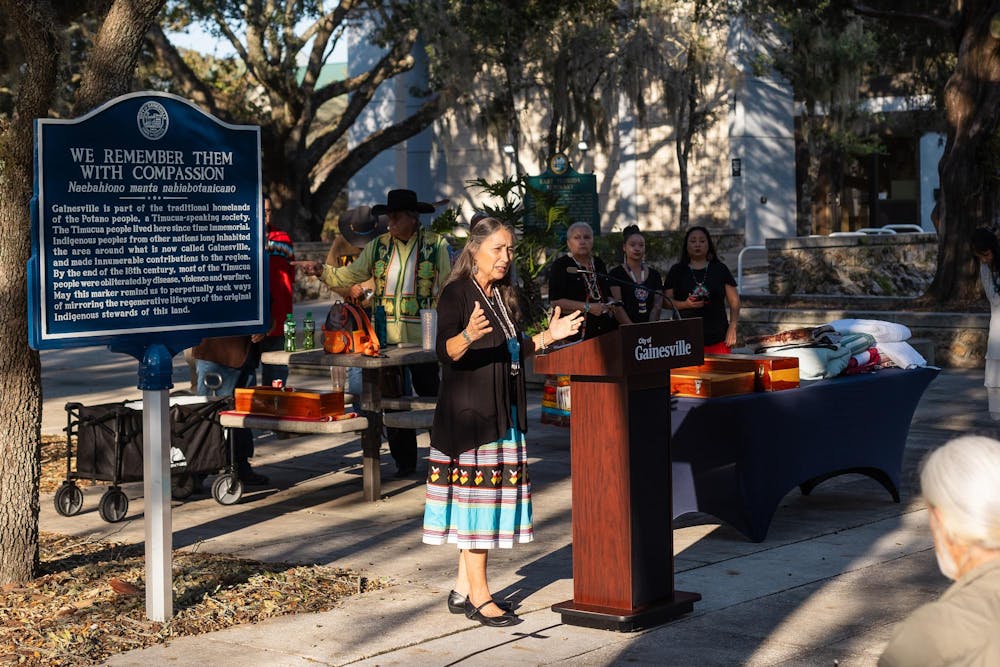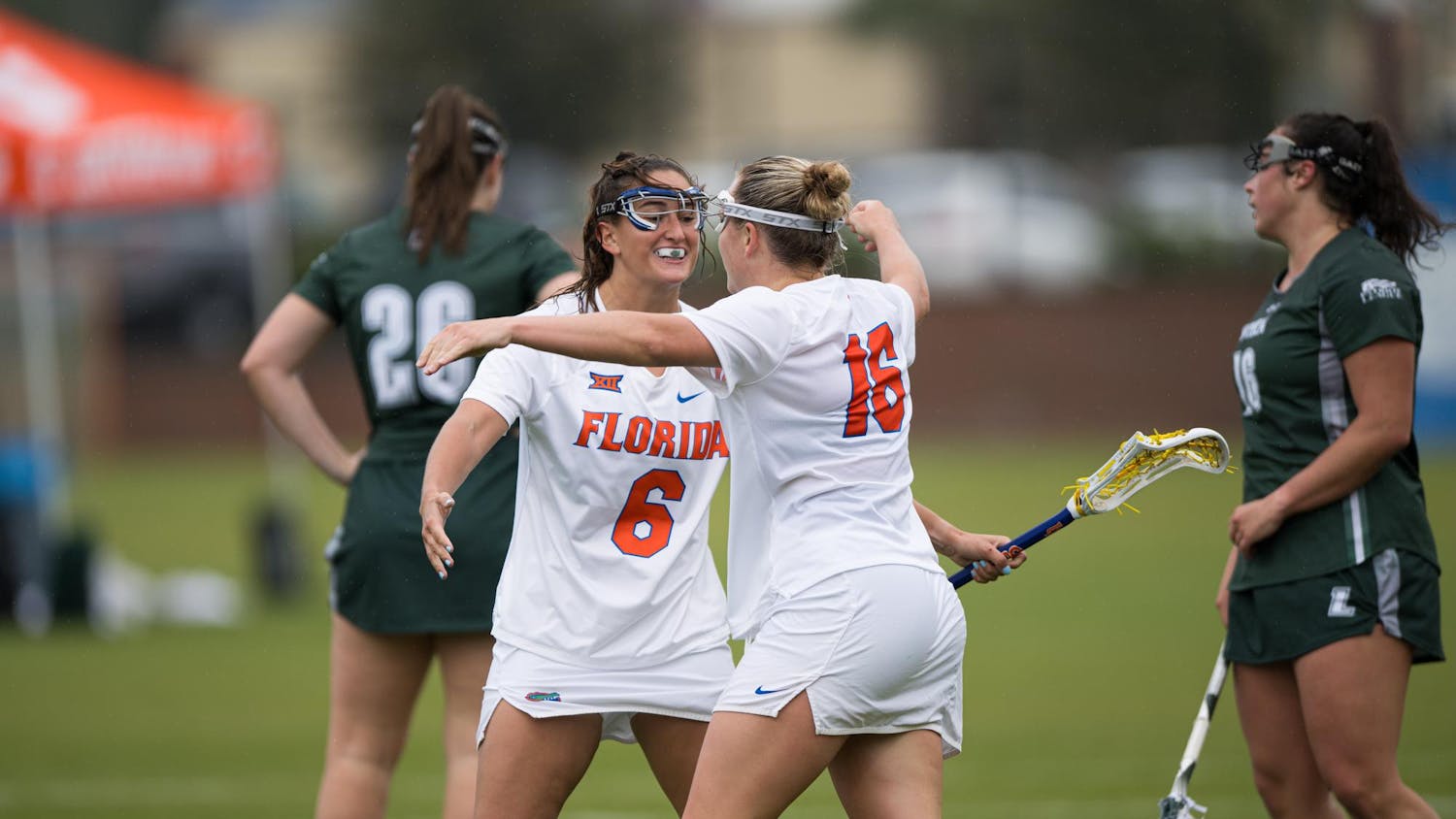As the sun began to set over Gainesville’s City Hall Plaza Monday, the rhythmic sounds of drums and flutes echoed through the crowd. The evening air filled with reverence.
Out of 411 cities in Florida, Gainesville is the only one to celebrate and officially recognize Indigenous Peoples’ Day on Oct. 14, Gainesville Mayor Harvey Ward said. The holiday honors the history of Native American cultures.
Florida does not officially recognize Indigenous Peoples’ Day as a legal holiday, according to state statutes. However, Florida officially recognizes Columbus Day.
Sylvia Paluzzi, a 61-year-old Gainesville resident, is the president of the Indigenous Peoples’ Task Force. Paluzzi and her team united with the city to replace Columbus Day and shine light on historical truths about colonialism, genocide and oppression faced by Native Americans, she said.
“If you want to understand the land that you’re on and the history of where you are living, it would be an invitation to start with the people who were here first,” she said. “So we can restore the broken loop the United States has created.”
During the event, Ward declared the “second Monday of every October” would be known as Indigenous Peoples’ Day citywide.
Ward said Gainesville will continue to honor and support the Indigenous community to set an example for other cities.
“My hope is that we use events like this to remind ourselves and create the stage to continue the conversation,” he said.
In addition to the proclamation, the Whitehorse family recited prayers, played instruments and discussed their heritage with the crowd.
Laura Whitehorse, a 52-year-old Mount Dora resident and information security analyst, is a citizen of the Muscogee Creek Nation and Choctaw tribe from Oklahoma.
Laura, along with the entire Whitehorse family, wore regalia, or cultural clothing and accessories, such as beaded medallions. Regalia is one of the many aspects of Indigenous culture that Laura feels is misunderstood by non-Indigenous people, she said.
“When you’re at a powwow, you’re dancing in your full regalia, and people say ‘Oh I love your costume,’” she said. “We have to explain it’s not a costume. It’s our culture.”
Mya Whitehorse, a 25-year-old Mount Dora resident, teacher’s assistant and Laura’s daughter, is a descendant of the Muscogee Creek Nation and a citizen of the Choctaw tribe from Oklahoma.
To Mya, Indigenous Peoples’ Day is about young generation representation to keep traditions alive, she said. As a teacher’s assistant, Mya feels schools don’t adequately teach the history of Indigenous peoples, she said.
“They [schools] don’t want to accept what happened back then,” she said. “I would love to see them teach about the genocide.”
Duane Whitehorse, a 77-year-old Ocala resident and member of the Kiowa tribe, led a prayer at the event.
For Duane, Indigenous Peoples’ Day is about “rectifying a wrong,” he said.
“Their [Indigenous peoples] blood is in this earth,” he said.
He emphasized how each of the 574 tribes in the United States speak a different language and have unique customs. Each tribe would learn some of each other’s words to trade for vegetables and buffalo, he said.
Preserving his tribe’s language helps keep its history alive, he said.
“My mother and father went to school and they were forced to speak English,” he said. “Their mouths were washed out with soap … they were beaten and whipped if they spoke their language.”
Maria Whitehorse, a 70-year-old Ocala resident and member of the Taino tribe, said she dances in local powwows to connect to her heritage.
Although most songs are about prayer, each powwow’s dances are dedicated to specific things, whether it be prayer or celebration, she said.
Tribes also do giveaways, or appreciations, in celebration. If it’s someone’s birthday, one doesn’t give presents to the person they’re honoring. Instead, they give gifts to others in their honor.
Maria said she feels most misrepresented by dancers who wear “bling bling,” or excessive regalia, and when others misinterpret what Indigenous prayer looks like.
“People think that just because we say prayer, something will be healed or some magic will happen,” she said.
Gainesville Commissioner Bryan Eastman attended the event to honor the “rich Indigenous history of Gainesville,” he said.
The Potano tribe, who were linguistically and culturally affiliated with the Timucua, originally resided on Alachua County’s land.
UF was constructed on top of Potano settlements and Timucua burial grounds, including the honored grounds by the UF College of Law.
The Florida Museum of Natural History holds collections from archeological sites associated with local tribes.
“We’re truly sitting on land that was fought for, for centuries,” Eastman said. “It’s also a deep part of the reason Gainesville exists.”
Contact Sara-James Ranta at sranta@alligator.org. Follow her on X @sarajamesranta.
Sara-James Ranta is a third-year journalism major, minoring in sociology of social justice and policy. Previously, she served as a general assignment reporter for The Alligator's university desk.






